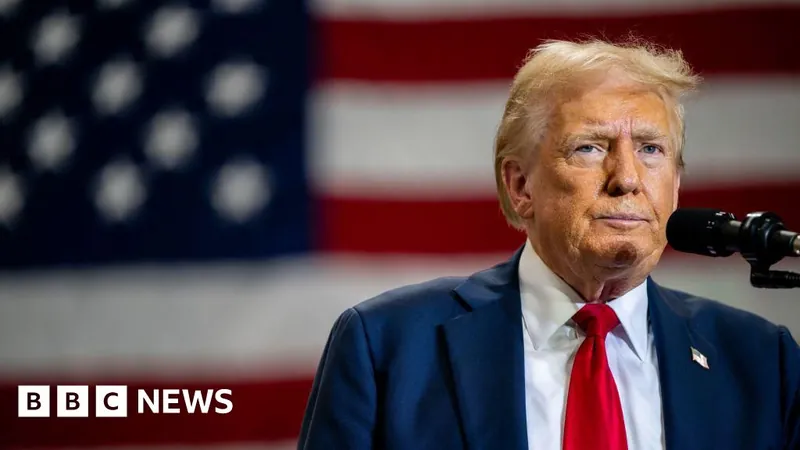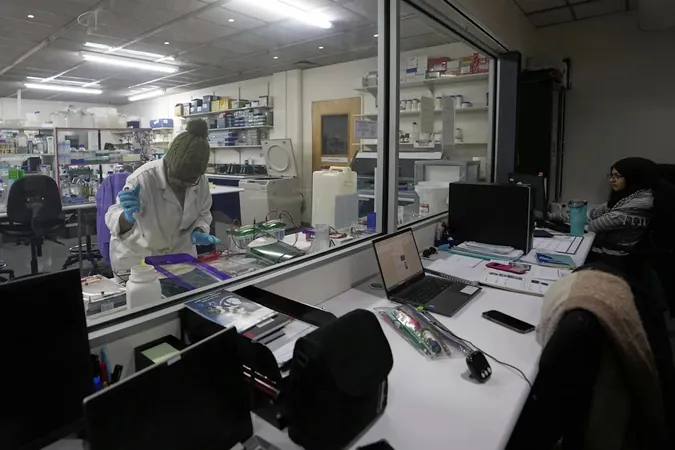
Shockwaves in U.S. Politics: Three Iranians Charged in Hacking Scandal Targeting Trump Campaign
2024-09-28
Author: Emma
Charges Filed Against Iranian Nationals
In a startling development, U.S. authorities have officially charged three Iranian nationals in connection with a hacking operation targeting the presidential campaign of former President Donald Trump. This incident marks a significant moment in the ongoing tensions between the United States and Iran, particularly in the context of election interference.
Allegations and Strategic Hacking Operation
Prosecutors assert that Masoud Jalili, Seyyed Ali Aghamiri, and Yasar Balaghi are affiliated with Iran's Islamic Revolutionary Guard Corps. They allegedly executed a strategic “hack and leak” operation aimed at tarnishing Trump’s campaign efforts. According to reports, the hackers attempted to distribute sensitive and stolen materials related to Trump's campaign to individuals linked with Joe Biden's re-election initiative.
FBI Confirms Iranian Involvement
Last week, U.S. intelligence officials disclosed that these Iranian operatives had made attempts to expose internal communications from the Trump campaign, a move which led to heightened scrutiny and concern over foreign interference in American elections. Although Iran’s government denied responsibility for the initial hacking claims, investigations by the Federal Bureau of Investigation confirmed their involvement.
Details of the Indictment
The indictment details a lengthy hacking campaign that spanned several years, beginning in 2020 and spotlighting the increasing aggressiveness of Iranian cyber activities during the current election cycle. The accused face 18 charges including wire fraud, identity theft, and providing material support to a designated foreign terrorist organization, not to mention serious hacking-related offenses.
Targeting of Campaigns
Interestingly, the hacking efforts intensified as the 2024 presidential race approached. In May of that year, the trio reportedly began targeting a campaign referred to as “U.S. Presidential campaign 1,” utilizing fraudulent email accounts that impersonated U.S. government officials. This manipulation allowed them to harvest sensitive documents and communications from unsuspecting campaign staffers.
Media Outreach with Stolen Information
By June, they allegedly attempted to leverage this stolen information, seeks to disseminate it to media outlets and associates linked with “U.S. Presidential campaign 2.” During a press conference, Attorney General Merrick Garland was queried about any use of the hacked materials by the Biden campaign, to which he confidently replied that “we’ve seen no indication that anyone replied.” He noted that both the Trump and Biden campaigns had cooperated with the FBI during the investigation.
Statements from Political Figures
Vice President Kamala Harris, who took over the Biden campaign after the presidential nomination, assured that her team was collaborating fully with law enforcement. Campaign spokesperson Morgan Finkelstein clarified that while individuals were targeted in phishing attempts, no substantial materials were directly transferred to the Harris campaign.
Implications for Cybersecurity
Amid this chaos, the indictment revealed compromised email accounts belonging to “a former, informal political consultant” for Trump’s campaign along with an unnamed official and an attorney. The implications of these actions raise alarming questions about cybersecurity and foreign interference in U.S. democracy.
FBI's Warning to Iran
FBI Director Christopher Wray issued a stern warning to the Iranian government, stating, “You and your hackers can’t hide behind your keyboards.” He emphasized that the charges reflect a rigorous and comprehensive investigation into these malicious cyber activities.
The Path Forward
As the 2024 election looms closer, experts are urging increased vigilance against potential foreign interference, highlighting the need for robust protective measures surrounding sensitive campaign information. This case underscores not only the complexities of international relations but also the realm of cybersecurity as it intertwines with the democratic process in the United States. Will this incident awaken the necessary changes to safeguard America's electoral integrity? Only time will tell.









 Brasil (PT)
Brasil (PT)
 Canada (EN)
Canada (EN)
 Chile (ES)
Chile (ES)
 Česko (CS)
Česko (CS)
 대한민국 (KO)
대한민국 (KO)
 España (ES)
España (ES)
 France (FR)
France (FR)
 Hong Kong (EN)
Hong Kong (EN)
 Italia (IT)
Italia (IT)
 日本 (JA)
日本 (JA)
 Magyarország (HU)
Magyarország (HU)
 Norge (NO)
Norge (NO)
 Polska (PL)
Polska (PL)
 Schweiz (DE)
Schweiz (DE)
 Singapore (EN)
Singapore (EN)
 Sverige (SV)
Sverige (SV)
 Suomi (FI)
Suomi (FI)
 Türkiye (TR)
Türkiye (TR)
 الإمارات العربية المتحدة (AR)
الإمارات العربية المتحدة (AR)